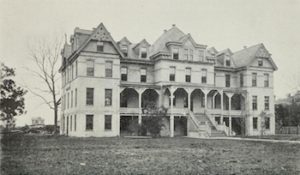
Chamberlain Hall
*The founding of Leland College is celebrated on this date in 1870. A Historical Black College and University (HBCU) was established as a college for Blacks in New Orleans, Louisiana, yet was open to all races. It was founded with support from the New York-based Baptist Free Mission Society.
Leland University opened as a coed school, borrowing its education principles from W.E.B DuBois. In his essay, “The Talented Tenth,” W.E.B DuBois praised Leland University as one of the six largest and most essential schools educating Black people at the time. DuBois also commended the school for having Greek and Latin as a curriculum.
Leland incorporated industrial education into its curriculum, teaching its students how to grow crops, make clothing, teach children, and be clergy members. Female students could study in the Domestic Sciences department, where students took classes in subjects like cooking and sewing. After its original buildings burned in 1923, it was relocated near Baker, Louisiana.
The school closed in 1960 because of financial difficulties. The Baker campus's 20.9-acre (8.5 ha) area, comprising four contributing properties and one non-contributing building, was listed on the National Register of Historic Places on November 10, 1982. The college facilities were already derelict at the time of listing. In the early 21st century, only the ruins of the two dormitories can be seen faintly through trees. Frame classroom, the President's House, and the Concrete Classroom all disappeared at some time. Former Alumni are Eddie Robinson, former Grambling State University head football coach - Class Year 1941, and John W. Joseph, the first black mayor of Opelousas, Louisiana.
Black American Colleges and Universities:
Profiles of Two-Year, Four-Year, & Professional Schools
by Levin Hill, Pub., Gale Group, 1994
ISBN: 0-02-864984-2